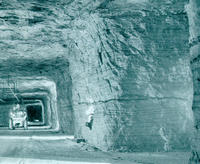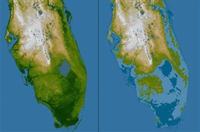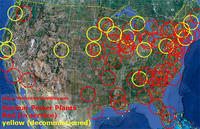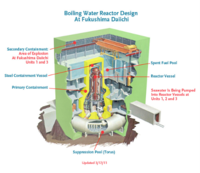-
Subterranean salt beds to keep U.S. nuclear waste

Beds of salt up to one kilometer thick lie within one or two kilometers of the surface across much of the United States; they were deposited hundreds of millions of years ago by evaporating seas; a new study suggests that since President Obama killed the only national nuclear waste burial program — the Yucca mountain site — the United States should look again at the pre-Yucca plan to bury nuclear waste in subterranean salt beds
-
-
Heavy snows divert Colorado River water shortage, for now

This winter, heavy snowfall in Utah, Colorado, and Wyoming have helped to avert a water crisis along the Colorado River; after an eleven year drought in the region, residents have begun to worry about impending water shortages; the Colorado River supplies nearly thirty million people in seven states with drinking water as well as Mexico; the heavy snows could bring only a brief moment of respite; with demand exceeding supplies and with each year bringing less water, there is potential for a future disaster; if supplies continue to decline, water deliveries will be reduced when Lake Mead’s water level drops below 1,075 feet; as of 1 February, Lake Mead’s water level was at 1,091feet
-
-
Sector Report for Monday, 4 April 2011: Infrastructure protection
This report contains the following stories.
Plus 2 additional stories
-
-
Recent major natural gas explosions could have been prevented
Last month, after a series of deadly accidents, the National Transportation Safety Board (NTSB) conducted hearings on the status of U.S. natural gas pipelines and found that utilities have long resisted implementing recommended safety measures leading to the increased likelihood of fatal explosions; the United States currently has more than 210 natural gas pipeline systems with roughly 21,000 miles of pipeline snaking throughout heavily populated areas; some of these pipes were first put in place more than eighty years ago; utilities could have minimized the damage caused by the recent explosions and even prevented the accidents from occurring had they installed safety valves, conducted regular testing, and replaced aging infrastructure
-
-
Protecting Japan from tsunamis
As Japan begins to rebuild after the massive 9.0 magnitude earthquake and tsunami, engineers are beginning to analyze the destruction to learn how to better prepare for future natural disasters; one expert says that prior to the earthquake, more infrastructures spending, particularly for projects aimed at preventing the approaching tsunami, could have mitigated much of the damage; the tsunami easily overwhelmed one of the tallest and longest seawalls in Japan; officials will have to decide whether to reinvest in costly tsunami infrastructure or to relocate communities further from the ocean to minimize the numbers affected by such events
-
-
Record number of infrastructure funds raising money, worst results in years
More private-equity infrastructure funds are seeking to raise money around the world than ever before, but with the increase in competition, funds are struggling to reach their funding goals; 131 unlisted infrastructure funds are seeking to raise a total of $92.1 billion; so far only two infrastructure funds reached their fundraising goals, raising a total of $600 million, the lowest amount in seven years; in the first quarter of 2010, seven funds met their goals raising a total of $7.5 billion dollars; infrastructure funds will likely become more popular as inflation rises but analysts expect funds to raise less money than in previous years
-
-
Water infrastructure budgets to see massive cuts in 2012
Next year water infrastructure projects and programs are expected to see massive budget cuts as President Obama has proposed slashing infrastructure spending at the Environmental Protection Agency (EPA) and the U.S. Army Corps of Engineers; the Drinking Water State Revolving Fund (SRF) will see nearly $400 million cuts and the Clean Water SRF will be cut nearly $600 million; according to Lisa Jackson, the EPA administrator, these cuts in SRF budgets reflect a return to a more “sustainable level”; states worry that cuts will make it difficult to fund future infrastructure upgrades; reports have shown that the United States faces a $500 billion shortfall for water infrastructure funding over the next twenty years
-
-
Report finds thousands of U.S. bridges in dangerous need of repair
Last week a new report found that nearly 12 percent of the bridges in the United States were “structurally deficient” and required replacement; the report found that major repairs and critical maintenance has often been delayed as states are struggling with budget shortfalls; the average age of bridges across the country is nearing forty-two years, and most were designed to have a fifty year lifespan before they were replaced or reconstructed; Transportation for America has called for increased federal funding for infrastructure to help make repairs; the American Society of Civil Engineers has recommended that the United States spend $17 billion a year on bridge maintenance, significantly more than the $10.5 billion that is currently spent each year
-
-
Waste ash from coal could save billions in repairing U.S. bridges and roads
The more than 450 coal-burning electric power plants in the United States produce about 130 million tons of “flyash” each year; before air pollution laws, those fine particles of soot and dust flew up smokestacks and into the air; power plants now collect the ash; researchers say that coating concrete destined to rebuild America’s crumbling bridges and roadways with some of the millions of tons of that left-over ash could extend the life of those structures by decades, saving billions of dollars of taxpayer money
-
-
Algae might help reduce nuclear waste
The humble algae — Closterium moniliferum — might one day soon be used to help separate strontium from calcium in nuclear waste; if successful, the process could lead to a reduction in the amount of nuclear waste that is left over from nuclear power facilities, and might even help in cleanup when accidents occur such as the one in Chernobyl, Ukraine, that spewed great quantities of strontium into the surrounding environment
-
-
U.S. earthquake resilience needs strengthening: report

A new National Research Council report presents a 20-year road map for increasing U.S. resilience to earthquakes, including a major earthquake that could strike a highly populated area.; the report was mostly written prior to the 11 March earthquake in Japan, but the committee of experts who authored it noted that the Japanese experience is a reminder of the devastation that can occur even in a country acknowledged as a leader in implementing earthquake-resilience measures
-
-
Rising seas and coastal risks

Most scientists believe that melt water from glaciers, the Greenland ice sheet, and possibly the West Antarctic ice sheet, along with thermal expansion from warming oceans, will raise sea levels by one-half to one meter (1.6 to 3.2 feet) over the next century and by one meter to two meters (6.5 feet) over the next 200 years; if sea level rises by a meter, “we will see higher tides, higher tidal velocities and tidal inundation every day,” says one expert; “And we’ll have a different shoreline”
-
-
U.S. reactors have weaker back-up batteries than Fukushima Daiichi had

Almost all American nuclear power plants have backup batteries that would last only half as long as those at Japan’s troubled Fukushima Daiichi plant did after a tsunami knocked out power there; just eleven of the U.S. 104 plants had eight-hour batteries, and 93 had four-hour batteries; the batteries are not powerful enough to run pumps that direct cooling water, but they can operate valves and can power instruments that give readings of water levels, flow and temperatures
-
-
Securing critical infrastructure no short term fix, experts say
Federal officials have long sought to secure critical infrastructure from potential attack, and recent events like the 2003 blackouts and the Stuxnet virus have added increasing urgency to government and private sector efforts; speaking on a panel at the Government Security conference and expo in Washington, D.C., security experts that specialize in critical infrastructure discussed the challenges of protecting infrastructure and steps that both governments and businesses can take; experts discussed addressing vulnerabilities in the smart grid, Stuxnet as a game changing cyber attack, and protecting critical infrastructure as a portfolio management problem
-
-
Fukushima Daiichi nuclear plant lost

The radioactive core in the Unit 2 reactor at the Fukushima Daiichi nuclear plant appears to have melted through the bottom of its containment vessel and is now resting on a concrete floor; officials are now struggling with two crucial but contradictory efforts: pumping in water to keep the fuel rods cool and pumping out contaminated water; an investigation found that Tokyo Electric Power Co. officials had dismissed scientific evidence and geological history that indicated that a massive earthquake — and subsequent tsunami — was far more likely than they believed; more than 11,000 bodies have been recovered, but officials say the final death toll is expected to exceed 18,000. Hundreds of thousands of people remain homeless, their homes and livelihoods destroyed. Damage could amount to $310 billion — the most expensive natural disaster on record
-
More headlines
The long view
Virtual Models Paving the Way for Advanced Nuclear Reactors
Computer models predict how reactors will behave, helping operators make decisions in real time. The digital twin technology using graph-neural networks may boost nuclear reactor efficiency and reliability.
